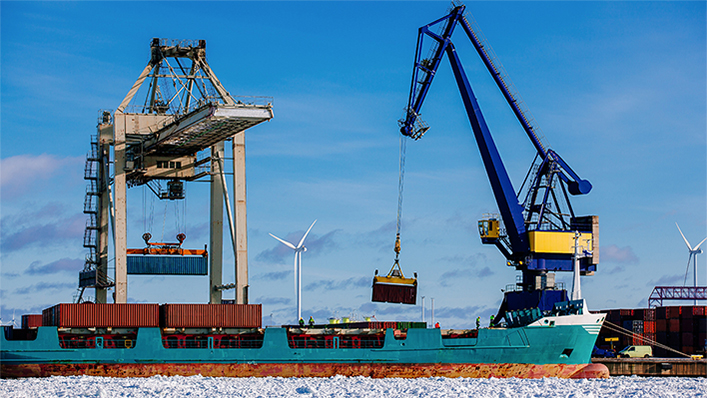
The Committee considered the trade in services aspect of the Free Trade Agreement between the Gulf Cooperation Council (GCC) member states and Singapore, which entered into force on 1 September 2013. The trade in goods aspect of the Agreement will be considered by the Committee on Trade and Development.
Saudi Arabia, which spoke on behalf of the GCC, noted that the Agreement consists of 10 chapters covering areas such as rules of origin, customs procedures, government procurement, electronic commerce and dispute settlement. Bahrain, Kuwait, Oman, Qatar and the United Arab Emirates are the other GCC members. Singapore said it is the first trade agreement the GCC has signed with a country outside the Middle East. The Agreement demonstrates a recognition of the importance of the parties’ economies in their respective regions, Singapore said, and represents a shared pursuit of their cooperation in new areas such as in the digital and green economy.
Members also considered three agreements between the United Kingdom and several partners which aim to ensure continuity and predictability following the UK’s withdrawal from the European Union.
The Trade Agreement between Switzerland and the United Kingdom entered into force on 1 January 2021. It largely replicates legal instruments which governed relations in trade in goods under the EU-Switzerland agreements. An additional agreement between Switzerland, the UK and Liechtenstein extends certain provisions of the agreement to the latter. The UK, speaking also on behalf of Switzerland, said detailed amendments have been included in the annexes to the Agreement to enhance certainty under the new bilateral context while certain provisions have not been transitioned into the Agreement, including under agriculture. Both parties further recognize that there are opportunities to deepen the trade relationship and work is underway to negotiate an enhanced Agreement, the UK said.
The Association Agreement between the United Kingdom and Tunisia also entered into force on 1 January 2021. The Agreement maintains tariff preferences provided between the parties under the EU-Tunisia Association Agreement. The UK maintains tariffs on around 15% of its tariff lines for imports from Tunisia while Tunisia maintains tariffs on around 23% of its tariff lines for imports from the UK. The UK also provides preferential access for certain products, mainly agricultural, such as olive oil exports, through tariff rate quotas. Certain other provisions of the EU-Tunisia Association Agreement, including on competition, the environment and labour are also incorporated into the Agreement.
The UK said Tunisia is a valued trading partner, with trade growing 49.5% as of the first quarter of 2021. Tunisia said the UK is its fourth-largest export destination and 11th largest source of imports.
The Free Trade Agreement between the United Kingdom and the Republic of Korea entered into force on 1 January 2021. Under the Agreement, the parties continued their implementation of the tariff elimination negotiated under the EU-Korea agreement. More than 99% of tariff lines were duty free for Korean products imported by the UK as of the entry into force of the Agreement in 2021 while tariff lines will be duty free for UK products imported by Korea by 2031. In services, commitments under the EU-Korea agreement were also maintained.
Korea said the UK is its fourth-largest European trading partner, with bilateral trade volumes growing by a third to US$ 11.8 billion in 2021, dispelling any concerns about a possible decline in economic activities due to Brexit and the COVID-19 pandemic. The UK said Korea is one of its closest trading partners in the Indo-Pacific. The UK added it welcomes the prospect of exploring new topics not yet included in the Agreement, such as further commitments on digital trade and small and medium enterprises.
Finally, the Committee considered the Free Trade Agreement between the Republic of Korea and the Republics of Central America. The Agreement entered into force for Honduras, Nicaragua and Korea on 1 October 2019, for Korea and Costa Rica on 1 November 2019 and for Korea and Panama on 1 March 2021. Upon full implementation in 2039, 95% of the parties’ tariff lines for goods will be duty-free. Trade in services is liberalized, on the basis of a negative list, for all except financial services. Investment, intellectual property rights, competition, state-owned enterprises, environment, labour, government procurement and electronic commerce are also regulated by the Agreement.
Korea said the Agreement will be a model of a win-win Agreement which boosts all parties’ exports and revitalises investment. Costa Rica, speaking on behalf of the Central American parties to the Agreement, said the value of trade has increased to US$ 641 million in 2021 from US$ 94 million in 2018.
Implementation of the RTA transparency mechanism
The Chair noted that 62 RTAs in force have still not been notified to the WTO. In addition, there are 51 RTAs involving WTO members and 37 involving non-members for which a factual presentation has to be prepared, counting goods and services separately. The Chair called on members to respond positively to his request for consultations to address the backlog.
The Chair also encouraged members to consider what could be improved in the Committee’s work, noting that General Council Chair Didier Chambovey (Switzerland) has already started consultations on WTO-wide reform efforts. Ambassador Lee said he was available to members interested in initiating discussions.
Next meeting
The next Committee meeting is tentatively scheduled for 14-15 November.
Share
Reach us to explore global export and import deals